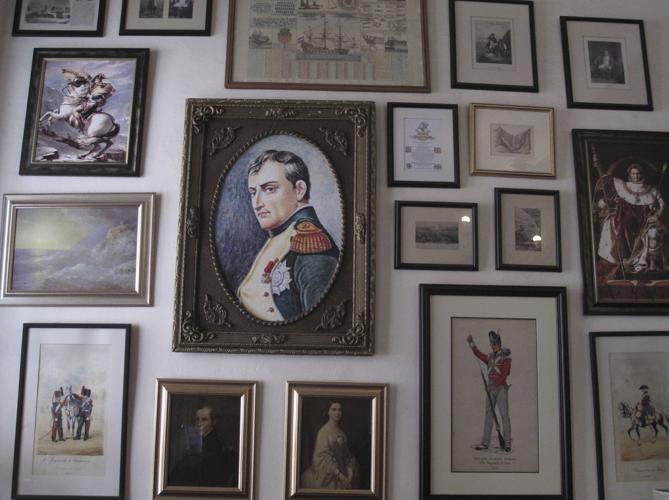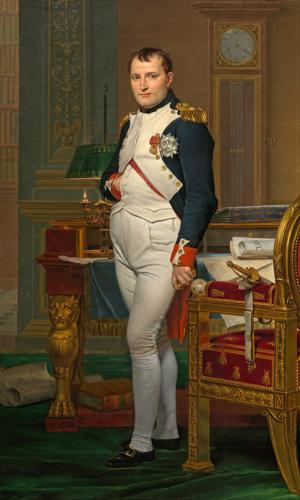There are many things that Napoleon Bonaparte was known for — his leadership abilities, his rise and fall, his height, his hand tucked in his coat, Josephine. In Louisiana, however, he is widely known for establishing the Napoleonic Code adopted from France that guides the legal system in the state.
Bonaparte’s influence on Louisiana’s civil law system intrigued Eric Tong, of Denham Springs.
“I understand that our legal system here in Louisiana is different because of our French and Spanish colonial history, but what are some of the specific major differences setting it apart from other states," Tong said. "In what ways does this affect everyday life, common legal situations, the ease of doing business in Louisiana, et cetera?”

Napoléon Bonaparte
Tong is correct. Louisiana is the only civil law jurisdiction in the United States, which was inspired by Napoleonic Code. Tong was born in Louisiana in 1985 but spent much of his life living out of state. When he came back to Louisiana in 2017, he began to pay attention to the state's civil law system and trying to understand how it was different from other states.
Tong was curious if Louisiana's unique law system affected business dealings because, as he explained, “people don’t want to invest in the place if the environment makes it harder.”
To answer Tong’s question, a look at history is necessary.
Melissa Lonegrass, a professor of law at the LSU Paul M. Hebert Law Center, teaches courses on Louisiana Civic Law, including a course titled, “Western Legal Traditions: Louisiana Impact,” a first-year course that introduces students to the differences and similarities of common law and civil law legal traditions.
Lonegrass explained that Louisiana had a European system of laws before it was integrated into the United States. Around the time that Louisiana became a state, French laws were being codified into a civil code. She said that the civil code applied to laws in private areas such as contracts, real estate transactions, wills, property disputes and marriage.
Since Louisiana culture was highly connected with European continental culture, Lonegrass said that the legal community in Louisiana wanted to maintain a civil law approach. Essentially, the community put all of the legal rules in one place, where the law could be accessible to everyone.

File photo (Oct. 15, 2017): Several images of Napoleon Bonaparte are shown in this collection of framed pictures on a wall in the Consulate hotel in Jamestown on St. Helena island in the Atlantic Ocean. Napoleon was sent into exile there in 1815 and died on the island in 1821; the relatively few tourists who make it to remote St. Helena are likely to visit Longwood House, where the deposed French emperor died after an illness. (AP photo/Christopher Torchia) ORG XMIT: XDF107
“We’re considered a mixed jurisdiction, not a purely civil law jurisdiction, because we have been quite obviously influenced by the American common law system,” Lonegrass said. “We may have different ways of approaching problems than other states, but often we reach the same results — just through different means.”
One specific difference between civil law and common law is the concept of forced heirship. In other states, when a person dies, he or she can leave a will that gives his property to anyone — kids, a surviving spouse or a charity. But, if that person wishes to disinherit his children, he can.
In Louisiana, Lonegrass said, because of our civil law tradition, the state follows forced heirship, which requires a person to leave a certain portion of property to his or her children. Before the rules were changed in the ’90s, a person had to leave one-fourth of the estate to children if there was one child and half of the estate if there was more than one child — regardless of the age of children.
Lonegrass said that the law has changed due to Louisiana’s desire to be less different from other states. Today, the law requires a person to leave the property to his children if the child is under the age of 24 or if the child suffers from a disability that leads to not being able to live independently.
When it comes to doing business in Louisiana, Lonegrass said that conducting business matters is no more or less difficult than any other state. Instead, the intricacies of civil law are more of a concern for legal experts than for businesses or entrepreneurs.
“There are some differences [with civil law], but it doesn’t make Louisiana weird or crazy,” said Lee Ann Lockridge, interim dean and professor of law at the LSU Paul M. Hebert Law Center. “Frankly, it makes Louisiana law a little easier for its citizens to understand.”


